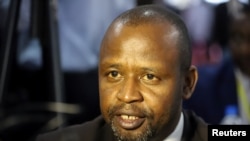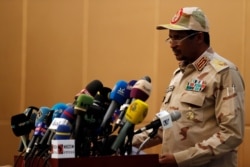Sudanese authorities who offered amnesty to the leaders of armed rebel groups last week held a peace ceremony to welcome them back to Khartoum.
The amnesty, which went into effect immediately after it was announced on Thursday, applies to all members of Sudanese opposition groups with the exception of those facing war crimes charges in the International Criminal Court.
Thousands of Sudanese citizens chanted, “Welcome to peace” as they beat drums and danced at Khartoum’s Freedom Yard on Sunday to welcome back about a dozen opposition leaders, their bodyguards and nearly 100 other members of rebel groups.
The rebel leaders included Al Hadi Idris, chairman of the Sudan Revolutionary Front, an umbrella organization of rebel groups which signed a peace agreement with Sudan’s transitional government in Juba, South Sudan.
Malik Aggar and Yassir Arman from the SPLM-North Aggar Faction also attended the event, as did Sudan Liberation Army head Minni Arco Minawi, Justice and Equality Movement’s Jibril Ibrahim, and Al Amin Dawood of the Beja community.
Minawi said he came to Khartoum to work with the transitional government to help implement the peace deal. "We must work to assume responsibility and leave our political differences [aside] so as to achieve democracy in our country,” said Minawi.
He said the presence of armed opposition leaders in Khartoum marks the end of war in Sudan and the beginning of peace that shifts the country’s focus to development.
Speaking at the same event, Mohammed Hamdan Dagalo, deputy head of Sudan’s ruling body, the Sovereign Council, welcomed the opposition leaders to the Sudanese capital, calling them brothers in peace.
“As we begin this new era in our beloved country, we need to unite our efforts to build it up more than any other time that passed. Let’s come together and speak one language and begin to rebuild the security and stability of this beautiful country,” said Dagalo.
Zahara Adam sang a peace song at the celebration with tears in her eyes. Adam, who comes from South Kordofan, one of Sudan’s longtime conflict zones, urged the government to extend an olive branch to rebel leader Abdulazeez Al Hilu and those in holdout groups.
“As I speak, tribal conflict is still going on in my area and I am deeply concerned about this. I want our government to reach out and save our young people in South Kordofan and in Abu Korshola locality. We cannot continue to take revenge on each other. Every day people are being killed,” Adam told VOA’s South Sudan in Focus.
Abdu Mohammed Juma of northern Darfur state said Sudan will never achieve lasting peace if does not arrest the men accused of committing war crimes in Darfur.
Sudan’s wealth also must be distributed equitably among its communities, said Juma.
“We need justice to prevail in this country. No one should take what is not his. We need citizens to enjoy their country. Every citizen has a right in this country and should not be denied,” Juma told South Sudan in Focus.
Many Sudanese say they are optimistic about what the future holds now that a peace deal is in place, but that they want their government to work faster on implementing reforms and to build the country’s economy.






